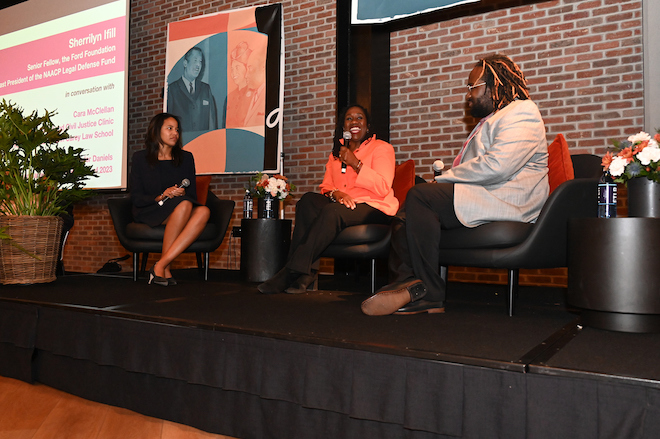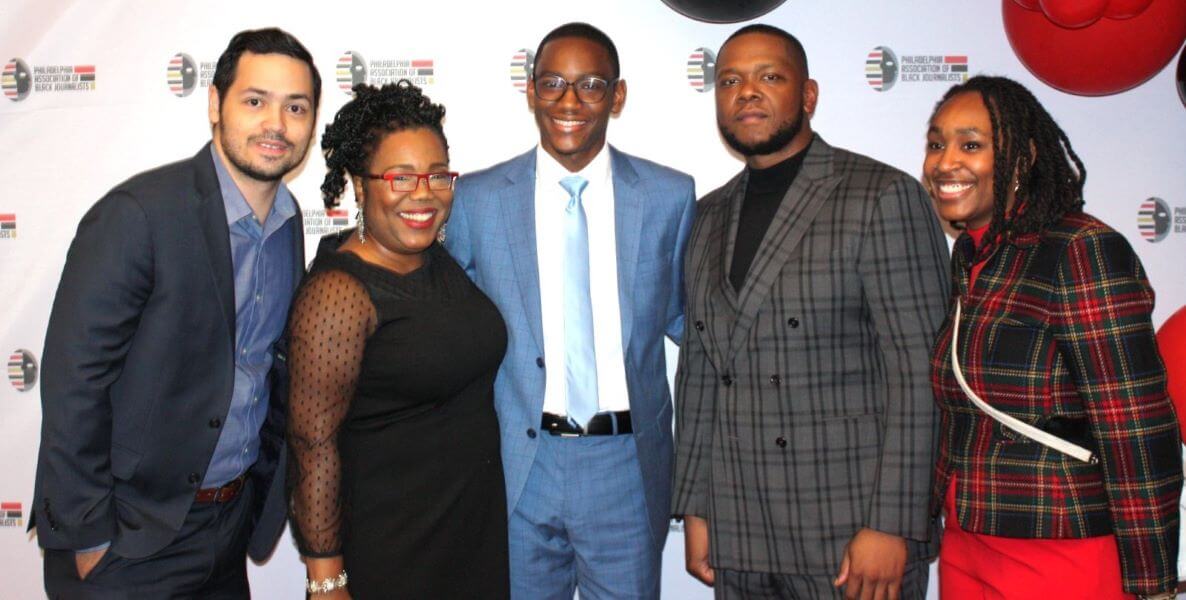I recently had the pleasure of being honored at the Philadelphia Association of Black Journalists (PABJ) Awards Gala for my work in government and journalism. It was delightful and humbling to be recognized. But those feelings pale in comparison to how enamored I was by being with other Black professionals.
Also at the gala were Black media powerhouses like 6ABC’s Sharrie Williams and Rick Williams, WDAS’ Patty Jackson — whose voice I just love — and NBC10’s Ric Harris. Like so many Philadelphians, I grew up on them, watching cable news with my grandmother and listening to WDAS in the car with my mother. The best part of meeting them was that they moved like regular people. Coming from the world of politics, where ego all too often trumps decency, it was refreshing to be around plain ol’ good people who were warm and embracing to me and the other young journalists in the room — something that’s not a given for young professionals.
Being with personalities who radiate wisdom, encouragement, and accountability was inspiring.
During his acceptance speech for the Journalist of the Year Award, Rick Williams shared that he overcame a stutter as a kid after his high school counselor told him he’d never do well in broadcast journalism. (Boy, did he prove them wrong). As he shared this moving story, I think everyone shed a collective tear. And watching Philadelphia magazine editor-at-large and PABJ president Ernest Owens advocate unabashedly for newsroom diversity made one straighten their back, ready to stand on their principles too.
Being with personalities who radiate such wisdom, encouragement, and accountability was awe-inspiring.

I had a similar feeling at The Philadelphia Citizen’s tribute to the late Judge A. Leon Higginbotham this month. The room was packed with Black law professors and attorneys from prominent law firms like Ballard Spahr. Observing, as I always do with people I admire, I saw them move with confidence and poise as they honored the legacy of Judge Higginbotham.
Since I was 11 years old, I’ve dreamt of being a lawyer. Before becoming a legislative aide to State Senator Sharif Street (who’s also an attorney), I was writing fake judicial decisions and legislation for fun. Having long been captivated by the legal profession and legal academia, it leaves an impression on me when I’m with lawyers who look like me, I can see myself doing what I aspire to do in law.
But in my experiences lies a greater implication. If I — having worked in professional settings with Black people since I was 14 — felt empowered at those events, imagine the considerable impact that seeing those role models would have on other young people who’ve not had my experiences.
Good role models are what many young Black men who resort to violent crime lack. The problem isn’t a complete absence of role models. Young people have them, but the ones they have are often no good. Take hammerheads like the drug-trafficking rapper Lontrell Donell Williams Jr., better known as Pooh Shiesty, who has set the standard for how many young Black men dress. With that caliber of role models, and an absence of resources, support, and mentors to redirect young people, it is no wonder we’ve lost our kids to the streets. Our city – our schools, our public and private organizations, and our neighbors – need to proactively expose young people to more positive influences immediately.
One way to fill this void of good role models is to get more Black male educators — exemplars of Black professionalism — in classrooms. Of my 12 years in Philly’s education system, I had only three Black male educators — and each had a tremendous impact on me. My third-grade teacher made it cool for me to be intelligent, my seventh-grade teacher gave me my first campaigning job, and my eighth-grade dean helped me build the backbone to be firm in my convictions.
Black male educators make profound impressions on Black students. So, the Black-male-educator deficiency in our schools is a grave problem. Especially because 43.6 percent of Philadelphians and 52 percent of School District students are Black. But only 23.7 percent of School District teachers are Black. It is then no surprise that test scores are below average and chronic truancy is high.
When students have Black male teachers, they perform better, becoming 39 percent less likely to drop out of high school and more likely to desire a college education. This is why the work of people like Sharif El-Mekki, founder of the Center for Black Educator Development, is so important. The mission of the Center is to increase “the number of Black educators so that low-income Black and other disenfranchised students can reap the full benefits of a quality public education.” Students are cheated out of that quality education when their teachers don’t reflect them.
If I — having worked in professional settings with Black people since I was 14 — felt empowered at those events, imagine the considerable impact that seeing those role models would have on other young people who’ve not had my experiences.
Folks respond well to people they can see themselves in. It resonates differently when a Black male teacher tells his Black student he can do better because that student can see better in their teacher and, instantly, better becomes attainable for that student. Confining stereotypes about Black men are crushed when walking displays of Black excellence are teaching you every day. That is the beauty of Black male mentorship.
Hopefully, with the work of people like Sharif El-Mekki, we’ll all wake up one day in a world where every young Black man has access to quality mentorship and role models — we all deserve it.
Jemille Q. Duncan is a public policy professional, columnist, and Gates Scholar at Swarthmore College. He is the former aide of two Philadelphia City Councilmembers and a Pennsylvania State Senator.
![]() RELATED COVERAGE OF THE BLACK TEACHER DEFICIT
RELATED COVERAGE OF THE BLACK TEACHER DEFICIT



